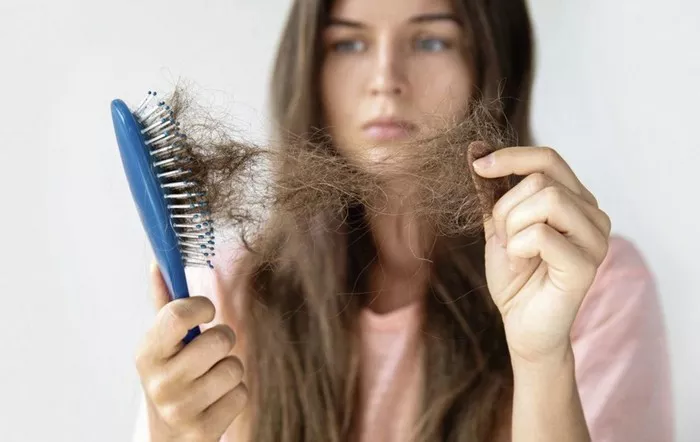Postpartum hair loss, often referred to as postpartum alopecia, is a common concern among new mothers. While this condition is a natural part of the post-delivery phase, it can be distressing. In this article, we will explore strategies to help new mothers reduce hair fall after giving birth. By following these recommendations, you can maintain healthy and vibrant hair while navigating the challenges of motherhood.
Understand the Causes of Postpartum Hair Loss:
Postpartum hair loss is mainly triggered by hormonal fluctuations during pregnancy. While you were pregnant, increased estrogen levels slowed down hair shedding. However, after childbirth, these hormone levels drop rapidly, causing hair to return to its natural growth and shedding cycles. It’s essential to understand that this process is temporary and should subside after a few months.
1. Hormonal Changes:
During pregnancy, your body experiences elevated levels of estrogen, which prolong the growth phase of hair and reduces the normal shedding process. After giving birth, the abrupt decline in estrogen levels triggers hair to enter the shedding phase, leading to postpartum hair loss.
2. Stress and Fatigue:
New mothers often face high levels of stress and fatigue, which can exacerbate hair fall. Chronic stress can affect the hair growth cycle, making it important to manage stress levels effectively.
Nutrition for Hair Health:
A well-balanced diet plays a crucial role in postpartum hair recovery. Nutrient-rich foods can help you regain hair strength and minimize hair loss. Include the following nutrients in your diet:
1. Biotin:
Biotin, also known as Vitamin H, promotes hair and nail health. You can find biotin in foods like eggs, nuts, and whole grains. Consider a biotin supplement if your diet lacks this essential nutrient.
2. Iron:
Iron deficiency can lead to hair loss. Include iron-rich foods like lean meats, spinach, and beans in your postpartum diet to maintain healthy hair.
3. Omega-3 Fatty Acids:
Omega-3 fatty acids found in fatty fish, flaxseeds, and walnuts can improve hair texture and reduce hair loss.
Gentle Hair Care Routine:
To minimize postpartum hair fall, adopt a gentle hair care routine. Avoid excessive styling, heat treatments, and tight hairstyles that can strain your hair. Instead, opt for the following practices:
1. Mild Shampoo:
Use a sulfate-free, mild shampoo that is suitable for your hair type. Avoid washing your hair too frequently, as over-washing can strip your scalp of natural oils.
2. Soft Hair Towel:
After washing your hair, use a soft, microfiber towel to blot and gently dry your hair. Avoid vigorous rubbing, which can weaken hair strands.
3. Hair Massage:
Massaging your scalp with natural oils like coconut or almond oil can stimulate blood flow, promoting hair growth and reducing hair fall.
Stay Hydrated and Manage Stress:
Adequate hydration is vital for overall health, including hair health. Drinking sufficient water helps in maintaining hair strength. Additionally, managing stress is crucial for preventing postpartum hair loss.
1. Hydration:
Aim to drink at least 8-10 glasses of water daily to keep your body and hair well-hydrated.
2. Stress Management:
Practice stress-reduction techniques such as meditation, deep breathing exercises, or yoga to manage stress levels effectively.
Consult a Healthcare Professional:
If your postpartum hair loss seems excessive or persists for an extended period, it’s advisable to consult a healthcare professional or dermatologist. They can help determine if there are underlying issues contributing to your hair loss and recommend appropriate treatments or supplements.
1. Hair Supplements:
In some cases, healthcare providers may recommend supplements like iron, biotin, or folic acid to address specific nutritional deficiencies.
2. Topical Treatments:
Topical treatments or medications may be prescribed to promote hair growth and reduce shedding.
See Also: Telogen Effluvium Shedding: When Does It Stop?
Conclusion:
Postpartum hair loss is a common concern for new mothers, but it is typically a temporary condition. By understanding its causes and adopting a healthy lifestyle, you can effectively reduce hair fall and restore your hair’s vitality. Prioritize proper nutrition, gentle hair care, and stress management to support your postpartum hair recovery journey. Remember that patience and self-care are essential during this phase, as your hair will eventually return to its normal state.


